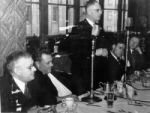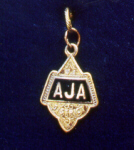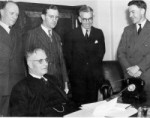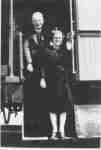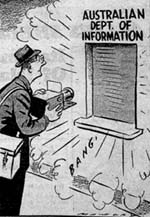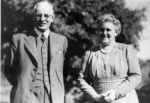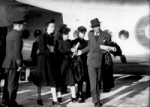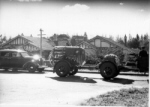
In his final years John Curtin, the prime minister, obviously liked being in the company of journalists.
His long-time friend Frank Davidson would pick him up at the Perth Railway Station in Davidson's 1928 Plymouth. They drove - sometimes just drove around - while Curtin talked about the war and old times in journalism with Frank, who was now the WA Director of the Department of Information.
Don Rodgers, Curtin's press secretary, provides a stern judgment on this fraternal link with journalists.
The
Australian Journalists' Association (AJA)
badge that John Curtin wore on his coat. Records of John Curtin. Member�s badge: AJA WA District, No 56. JCPML00287/11.
Don Rodgers recalls Prime Minister Curtin's relations with the Press
His relations with the Press were very amiable, he had worked as editor of the "West Australian Worker" (sic) and as a casual on the "West Australian", the Perth daily newspaper, but frankly I don't think he could have earned a living as a journalist.
He wore
his AJA badge on his coat and I think, like some people who are on the
fringe of a profession, they like to be on the inside with the members
of that profession, so I think he enjoyed the position of being accepted
by journalists as a former journalist though, as I said, frankly I don't
think he could have earned a living as a journalist. The journalists were
on first name terms to him...
Extract from Don Rodgers' Oral History
It was fortunate Curtin liked being with journalists. Firstly there had always been a number of them in Federal Parliament. Also, Don Rodgers organised twice daily briefings with senior journalists which Curtin clearly enjoyed, although they took up a significant amount of his time.
There were also even more secret briefings for selected journalists. The meetings were frank but there was always the final sanction of censorship, which was occasionally threatened by Rodgers
The Prime Minister and the Press: A Study in Intimacy
Curtin went for 'spin' (helped by his press secretary) just as much as any modern counterpart. But he applied it himself, and relied on his force of personality and argument to carry the case. He also was playing the tactic of 'trading' - the provision of information was an inducement, direct and indirect, to get editorial support.
Extract from Occasional Paper by
Michelle Grattan
Curtin's first announcement of the Japanese bombing of Darwin stressed material damage, minimised casualties, and demanded that any other report be rejected. In fact at least 300 had been killed and current estimates range as high as 2000.
Rodgers' oral history interview confirms his interest in helping to put an appropriate spin on the news. It indicates also that he had some difficulty in doing this with the prime minister's wife, Elsie.
Don Rodgers remembers Elsie Curtin
In travelling, he often became lonely because he was very attached to his wife, whose nickname was Nippy.
She was also a champion political brick-dropper and I know he was often affected politically because she would make statements which he'd have to do something about, but the affection between them was undoubted.
Extract from Don Rodgers' Oral History
There was also a problem with censorship, which seemed set to intensify when Arthur Calwell, a long-term hater of the 'capitalist press', became Minister for Information. Curtin remained sanguine: "He's been fighting with newspapers all this time - now he can learn to live with them". He didn't, but the appointment ensured that the proprietors would direct their anger towards Calwell and not Curtin.
Meanwhile arguments raged: was it really a breach of censorship for proprietors to put out their newspapers with blank spaces on the front pages, indicating that the censor had struck?
�Snapped� Daily Telegraph 3 June 1943. Artist Will Mahony.
During the war years, Victor Courtney and J J Simons, Curtin's bitter enemies of the twenties, had become considerable newspaper proprietors - and strong supporters of the Curtin Government.
In his last days, John Curtin contacted Simons, who was in Sydney, and asked him to Canberra. They chatted about Curtin's time as editor of the Westralian Worker, their combined battle against conscription, and their bitter fight with each other.
The following week, on 5 July 1945, Prime Minister Curtin died.
When Don Rodgers flew to Perth in July 1945 for the prime minister's funeral, he was met by Frank Davidson. 'We've brought the Boss home for the last time', Rodgers said.
Then two of the toughest journos wept.
The Sunday Times, now controlled by Simons and Courtney, published tributes from a number of journalists.
Don Rodgers wrote a special piece about the loss of the Boss - 'There'll never be another like him'.
Victor Courtney wrote about 'Our Friend, John Curtin' of 'more than a quarter of a century', which was stretching things a bit, and published his poem entitled 'Tribute'.
"There'll Never Be Another Like Him"
The boss has gone and there'll never be another like him.
...Mr Curtin only complained to me on 2 occasions. One was when a certain member of the Party had done him a grevous injustice. I was furious and said so. He replied; "My boy, don't ever expect gratitude in politics."
Excerpt from Sunday Times 8 July 1945
OUR FRIEND, JOHN CURTIN
Our friend, John Curtin, has gone from us.
It seems more fitting
to say "our friend" than to say "our Prime Minister".
He has been our Prime Minister for 3 years. He has been our friend for
more than a quarter of a century.
John Curtin was part of our everyday life long before he was Prime Minister.
He figured in our ordinary affairs. He travelled up and down by train
or bus from Cottesloe, went to lunch at city cafes, to pictures and meetings,
and football and cricket matches, moved about among us.
Then he became Prime Minister.
But the change-over did not change the man. When he came back he still moved about in the same way, called to see his old friends in the little spare time he had, met and chatted with people in the streets, moved and mixed as he did in the old days.
-VEE-CEE
Excerpt from Sunday Times 8 July 1945
TRIBUTE
The
tired statesman's cares are laid aside,
And he who filled so loyally his part,
In so much of our pain and toil and pride
Seems closer now unto the people's heart.
He sought no glories that the selfish need
No tinsel, nor was moved by blame or praise,
In simple manly faith he came to lead
Australia in Australia's darkest days.
We mourn him, and in mourning him we know
Such men in any nation's life are rare.
'Tis bitter truth that only when they go
We realise the load they had to bear.
No poignant words are needed to convey
Our loss, or deeper tragedy to lend.
"He was our chosen leader," we can say,
But even more than that - he was our friend.
-VICTOR COURTNEY.
Sunday Times 8 July 1945
Peter Batten, the editor of the Mirror at the time of Curtin's death, recounted in his paper's obituary the chats he had with Fred Gates about Gate's time as number two at the Westralian Worker.
Batten would ask: 'Freddie, what's the difference between John Curtin the journalist and John Curtin PM?'
And Gates would reply 'None. They're the same person. He gave all his concentration and all his intelligence to both jobs.'
Curtin's old office at the Worker building, whence the socialist message was spread, was incorporated into a boarding house for down-and-outs. As the Sunday Times, which was housed next door, expanded, the space became a director's dining room and later a director's office. The Sunday Times was by now owned by Rupert Murdoch, the capitalist press tzar par excellence.
Like to test your knowledge? Try out our friendly online quiz and Mix & Match Activity.
